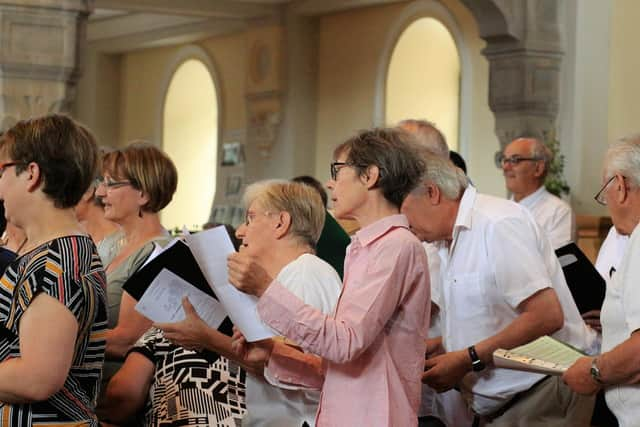A reminder of my childhood with memories of church hymns - Ian McMillan
On Fridays I went to the Church Lads’ Brigade, and I have to say that it’s still a source of pain to me that I never got to play the big bass drum. I tried choir practice a couple of times but Mr Strickland told me to stand at the back so I decided that the life of a chorister wasn’t for me.
I wasn’t, then or now, particularly holy or devout but in those faraway days it was just something we did as a family and the older I get, the more I realise that the rhythms of my thinking and, to a certain extent, the cadences of my speech and the shapes of my written stanzas and sentences and paragraphs are the legacy of all those hours sitting in the pew and watching the sunlight streaming through the stained glass windows of All Saints’ Church in Darfield.
Advertisement
Hide AdAdvertisement
Hide AdAll Saints was, and is, a Church of England establishment and when I was a regular member of the congregation in the 1960s, they still used the old Book of Common Prayer and an old translation of the Bible, which meant that the language was resonant and musical and sometimes beyond my comprehension and I often wonder if that’s why I’ve always been attracted to the sound of language as much as, if not more than, the meaning.


These days when I read a poem that I can’t quite fathom, I settle myself into the sonic luxuriance of the language like I am settling myself into Evensong and somehow meaning drifts to the surface (or doesn’t, and I don’t mind) as I read the poem aloud.
There would be hymns at those church services, of course, and ones I remember most are the ones that celebrated the meeting of lyrics and tune in a way that meant they became something more than the sum of their parts.
Hills of the North, Rejoice was, and still is, one of my favourites, particularly the line “shores of the utmost West” in one of the later verses. It’s a line that rings with powerful words like “utmost” and as a child I had no idea what utmost meant but I loved the way it rang like a slightly muffled bell.
Advertisement
Hide AdAdvertisement
Hide AdI loved the psalms, too; the way the rector and choir would intone the lines in a space that was somewhere between music and speech; it was like the air in the church was a beach and the psalm-tide was coming in and going out and coming in and going out.
The sermon was a little section of storytelling and again I have to say that I enjoyed the melody of the speech as much as the lessons they were trying to teach us.
We had a Church Army captain, Captain Lavery, who had a wonderful and church-filling voice with a Belfast accent that was jewel-like in its gleaming vowels and consonants and I recall one of his sermons about Adam and Eve where he talked about “the worm in the apple in the Garden of Eden” and he pronounced apple as “ayple”, which made me smile with joy then, as it makes me smile with joy now.
In fact, I just chanted this column as you might chant a psalm and it sounded authentically psalm-like, which just goes to show that the language you hear as a child will stay with you for ever.
Or for ever and ever, amen.